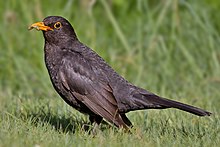Le Merle noir

Le Merle noir ("The Blackbird") is a chamber miniature by the French composer Olivier Messiaen for flute and piano. Written and first performed in 1952[1] it is one of the composer's shortest independently published works, lasting just over five minutes. It bears neither time nor key signature.
History
[edit]The composition originated in a 1952 commission for a test piece for flute for the Conservatoire de Paris, where Messiaen served as professor of harmony and musical analysis.[2] For that year, the first-prize winners in the Concours de flûte were Daniel Morlier, Jean-Pierre Eustache, Jean Ornetti, Régis Calle, and British flautist Alexander Murray.[3]
Messiaen had a consuming, lifelong interest in ornithology, particularly birdsong. While not his first work to incorporate stylised birdsong (this was L'Ascension), Le Merle noir was the earliest of his pieces to use authentically transcribed birdsong; in this case, a common blackbird's,[4] foreshadowing Messiaen's later, more extended birdsong-inspired pieces.
Later that year, the score was published by Éditions Alphonse Leduc as engraved by Gautier. Messiaen's fair copy lies amongst the collections of the Morgan Library and Museum in New York City; his sketches are now possessed by the Parisian Bibliothèque nationale de France.
References
[edit]- Hill, Peter and Simeone, Nigel (2005). Messiaen. Yale University Press, New Haven and London. ISBN 0-300-10907-5.
{{cite book}}: CS1 maint: multiple names: authors list (link) - Griffiths, Paul (2001). "Olivier Messiaen". Grove Music Online (8th ed.). Oxford University Press. ISBN 978-1-56159-263-0.
Notes
[edit]External links
[edit]- Le merle noir (with synchronised score); played by Christian Lardé on flute with piano accompaniment by Yvonne Loriod, the composer's second wife
